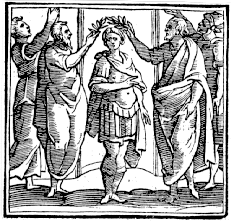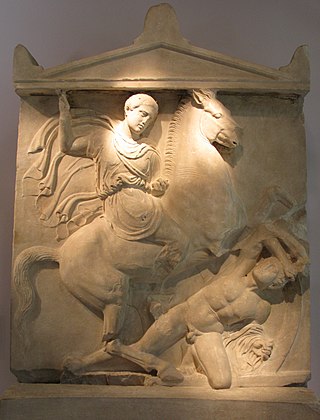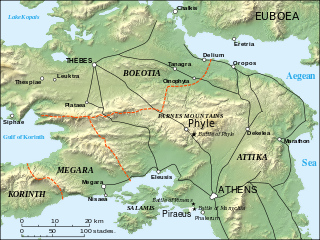
This article concerns the period 409 BC – 400 BC.

Lysander was a Spartan military and political leader. He destroyed the Athenian fleet at the Battle of Aegospotami in 405 BC, forcing Athens to capitulate and bringing the Peloponnesian War to an end. He then played a key role in Sparta's domination of Greece for the next decade until his death at the Battle of Haliartus.
Year 403 BC was a year of the pre-Julian Roman calendar. At the time, it was known as the Year of the Tribunate of Mamercinus, Varus, Potitus, Iullus, Crassus and Fusus. The denomination 403 BC for this year has been used since the early medieval period, when the Anno Domini calendar era became the prevalent method in Europe for naming years.

Thrasybulus was an Athenian general and democratic leader. In 411 BC, in the wake of an oligarchic coup at Athens, the pro-democracy sailors at Samos elected him as a general, making him a primary leader of the ultimately successful democratic resistance to the coup. As general, he was responsible for recalling the controversial nobleman Alcibiades from exile, and the two worked together extensively over the next several years. In 411 and 410, Thrasybulus was in command along with Alcibiades and others at several critical Athenian naval victories.

Alcibiades was an Athenian statesman and general. The last of the Alcmaeonidae, he played a major role in the second half of the Peloponnesian War as a strategic advisor, military commander, and politician, but subsequently fell from prominence.

Theramenes was an Athenian military leader and statesman, prominent in the final decade of the Peloponnesian War. He was active during the two periods of oligarchic government at Athens, the 400 and later the Thirty Tyrants, as well as in the trial of the generals who had commanded at Arginusae in 406 BC. A moderate oligarch, he often found himself caught between the democrats on the one hand and the extremist oligarchs on the other. Successful in replacing a narrow oligarchy with a broader one in 411 BC, he failed to achieve the same end in 404 BC, and was executed by the extremists whose policies he had opposed.
Spartan hegemony refers to the period of dominance by Sparta in Greek affairs from 404 to 371 BC. Even before this period the polis of Sparta was the greatest military land power of classical Greek antiquity and governed, dominated or influenced the entire Peloponnese. The defeat of the Athenians and the Delian League in the Peloponnesian War in 431–404 BC resulted in a short-lived Spartan dominance of the southern Greek world from 404 to 371 BC. Due to their mistrust of others, Spartans discouraged the creation of records about their internal affairs. The only histories of Sparta are from the writings of Xenophon, Thucydides, Herodotus and Plutarch, none of whom were Spartans. Plutarch was writing several centuries after the period of Spartan hegemony had ceased. This creates difficulties in understanding the Spartan political system, which was distinctly different from any other Greek polis.
The Battle of Aegospotami was a naval confrontation that took place in 405 BC and was the last major battle of the Peloponnesian War. In the battle, a Spartan fleet under Lysander destroyed the Athenian navy. This effectively ended the war, since Athens could not import grain or communicate with its empire without control of the sea.
The Thirty Tyrants were an oligarchy that briefly ruled Athens from 405 BC to 404 BC. Installed into power by the Spartans after the Athenian surrender in the Peloponnesian War, the Thirty became known for their tyrannical rule, first being called "The Thirty Tyrants" by Polycrates. Although they maintained power for only eight months, their reign resulted in the killing of 5% of the Athenian population, the confiscation of citizens' property, and the exile of other democratic supporters.
The Battle of Cyzicus took place in May or June 410 BC during the Peloponnesian War. During the battle, an Athenian fleet commanded by Alcibiades, Thrasybulus, and Theramenes routed and destroyed a Spartan fleet commanded by Mindarus. The victory allowed Athens to recover control over a number of cities in the Hellespont over the next year. In the wake of their defeat, the Spartans made a peace offer, which the Athenians rejected.

The Corinthian War was a conflict in ancient Greece which pitted Sparta against a coalition of city-states comprising Thebes, Athens, Corinth and Argos, backed by the Achaemenid Empire. The war was caused by dissatisfaction with Spartan imperialism in the aftermath of the Peloponnesian War, both from Athens, the defeated side in that conflict, and from Sparta's former allies, Corinth and Thebes, who had not been properly rewarded. Taking advantage of the fact that the Spartan king Agesilaus II was away campaigning in Asia against the Achaemenid Empire, Thebes, Athens, Corinth and Argos forged an alliance in 395 BC with the goal of ending Spartan hegemony over Greece; the allies' war council was located in Corinth, which gave its name to the war. By the end of the conflict, the allies had failed to end Spartan hegemony over Greece, although Sparta was durably weakened by the war.
Thrasyllus was an Athenian strategos (general) and statesman who rose to prominence in the later years of the Peloponnesian War. First appearing in Athenian politics in 410 BC, in the wake of the Athenian coup of 411 BC, he played a role in organizing democratic resistance in an Athenian fleet at Samos. There, he was elected strategos by the sailors and soldiers of the fleet, and held the position until he was controversially executed several years later after the Battle of Arginusae.

The Battle of Nemea of 394 BC, also known in ancient Athens as the Battle of Corinth, was a battle in the Corinthian War, between Sparta and the coalition of Argos, Athens, Corinth, and Thebes. The battle was fought in Corinthian territory, at the dry bed of the Nemea River. The battle was a decisive Spartan victory, which, coupled with the Battle of Coronea later in the same year, gave Sparta the advantage in the early fighting on the Greek mainland.

The Battle of Munychia was fought between Athenians exiled by the oligarchic government of the Thirty Tyrants and the forces of that government, supported by a Spartan garrison. In the battle, a substantially superior force composed of the Spartan garrison of Athens and the army of the oligarchic government attacked a hill in Piraeus which had been seized by 1,000 exiles under Thrasybulus, but was defeated. After this defeat, the Thirty Tyrants were forced to flee to Eleusis.

The Battle of Piraeus was fought in 403 BC between Athenian exiles who had defeated the government of the Thirty Tyrants and occupied Piraeus and a Spartan force sent to combat them. In the battle, the Spartans narrowly defeated the exiles, with both sides suffering appreciable casualties. After the battle, Pausanias arranged a settlement between the two parties which allowed the reestablishment of democratic government in Athens.

Teleutias was the brother of the Spartan king Agesilaus II, and a Spartan naval commander in the Corinthian War. He first saw action in the campaign to regain control of the Corinthian Gulf after the Spartan naval disaster at Cnidus in 394 BC, and was later active in the Spartan campaign against Argos in 391 BC. Later that year, he was dispatched to the Aegean to take command of a Spartan fleet harassing Rhodes. Once in command, he attacked and seized a small Athenian fleet sailing to aid Evagoras I of Salamis, Cyprus, then settled in to attack Rhodes with his newly augmented fleet.

The Last of the Wine is Mary Renault's first novel set in ancient Greece, the setting that would become her most important arena. The novel was published in 1956 and is the second of her works to feature male homosexuality as a major theme. It was a bestseller within the gay community. The book is a portrait of Athens at the close of the Golden Age and the end of the Peloponnesian War with Sparta, and includes Socrates as a character.
The Phyle Campaign was the civil war that resulted from the Spartan imposition of a narrow oligarchy on Athens and resulted in the restoration of Athenian democracy.

The Theban–Spartan War of 378–362 BC was a series of military conflicts fought between Sparta and Thebes for hegemony over Greece. Sparta had emerged victorious from the Peloponnesian War against Athens, and occupied an hegemonic position over Greece. However, the Spartans' violent interventionism upset their former allies, especially Thebes and Corinth. The resulting Corinthian War ended with a difficult Spartan victory, but the Boeotian League headed by Thebes was also disbanded.

Pausanias was the Agiad King of Sparta; the son of Pleistoanax. He ruled Sparta from 445 BC to 427 BC and again from 409 BC to 395 BC. He was the leader of the faction in Sparta that opposed the imperialist policy conducted by Lysander.










